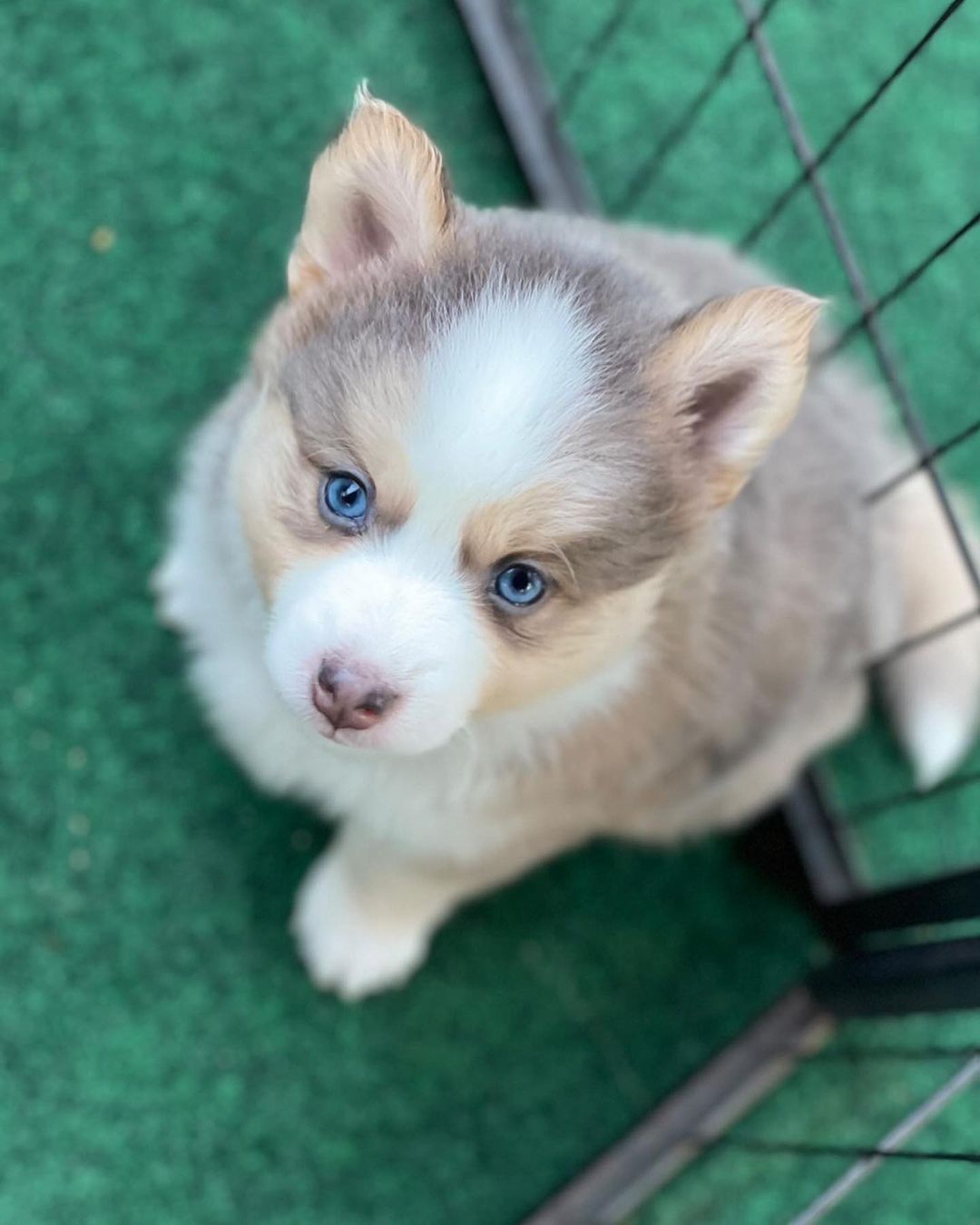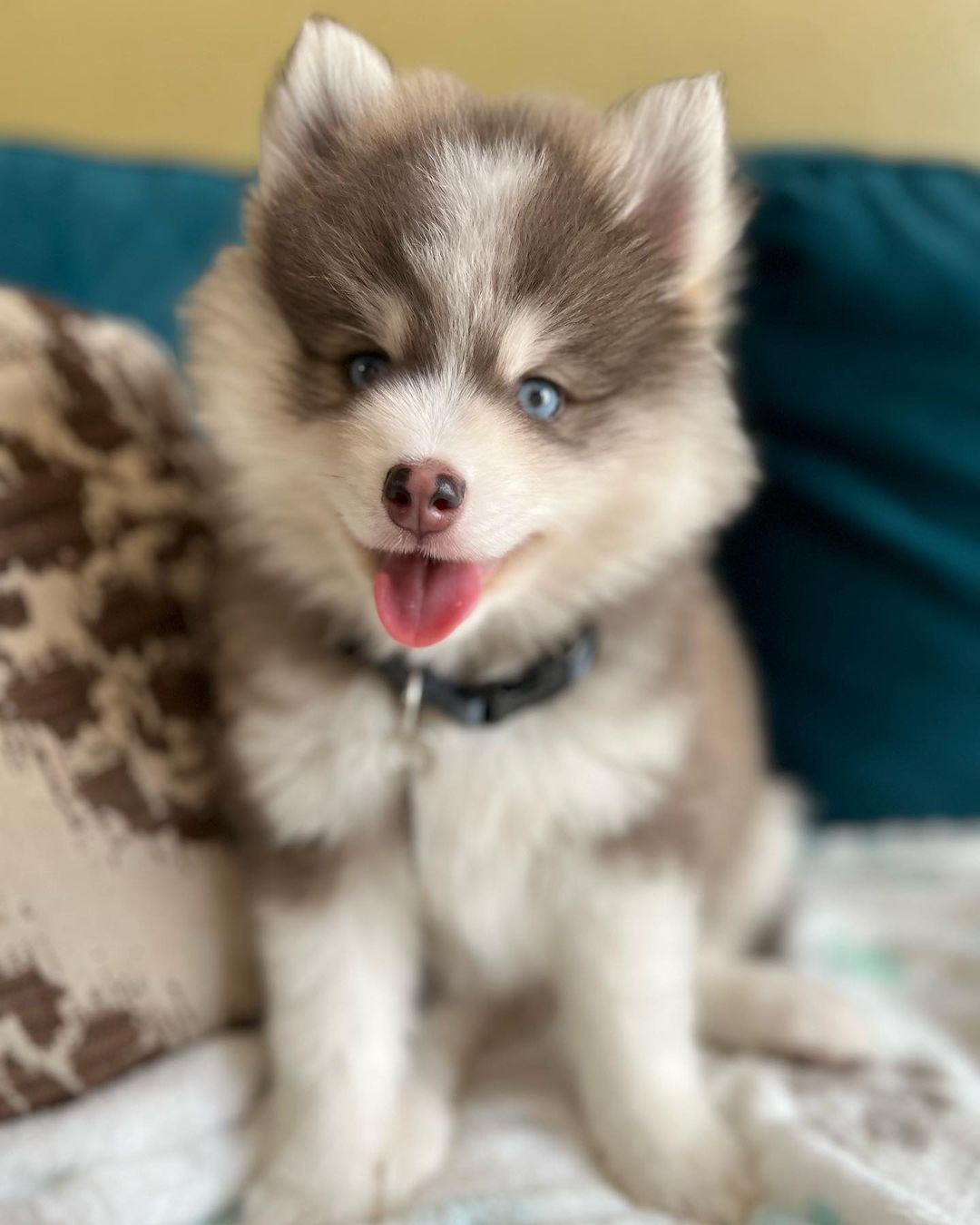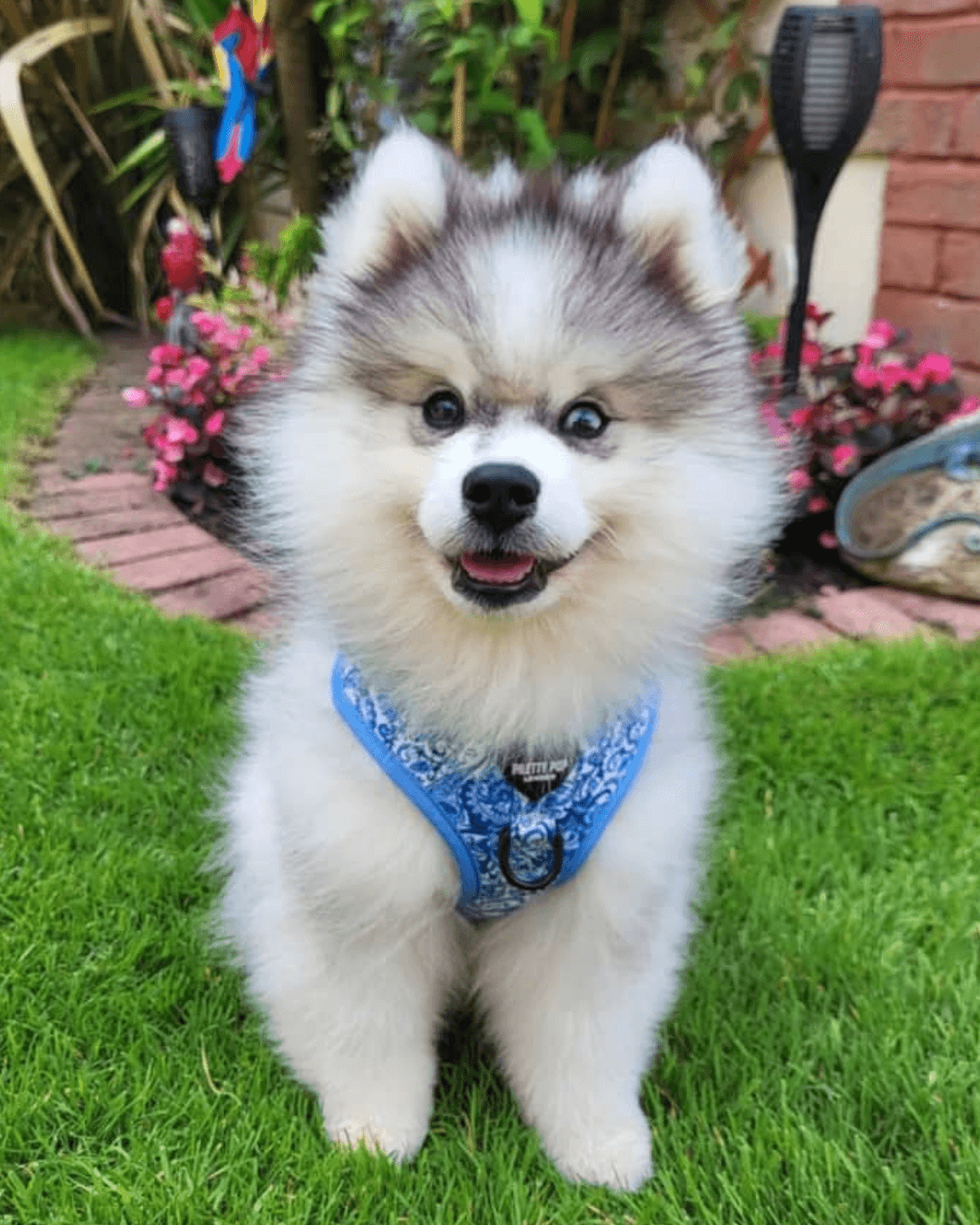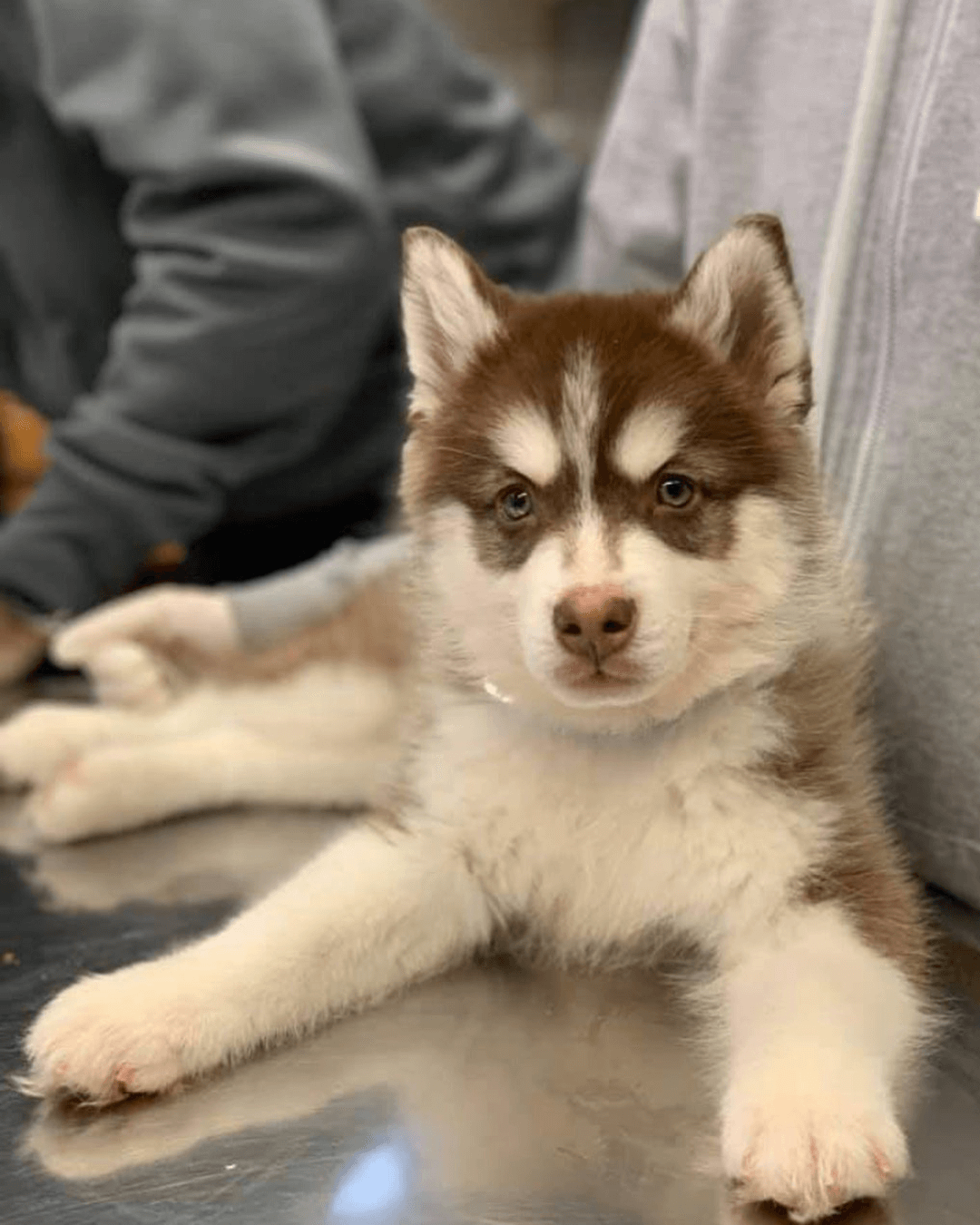Available Pomsky Dog Breeds for Sale
Discover our adorable Pomskies available for sale or adoption! These charming hybrids combine the best traits of Huskies and Pomeranians, making them affectionate and playful companions. Give a loving home to a Pomsky today!
Find Your Perfect Companion: Pomsky Dogs for Sale
Welcome to Zion Husky & Pomsky Breeder, your trusted source for healthy, happy, and well-socialized Pomsky puppies for sale. We are a passionate and ethical breeder dedicated to raising exceptional Pomsky dogs and connecting them with loving, forever homes across the globe. If you’ve fallen in love with the idea of a fluffy, charismatic dog that combines the stunning looks of a Siberian Husky with the manageable size of a Pomeranian, you’ve come to the right place.
The Pomsky is more than just a cute face; they are a perfect blend of two beloved breeds. They inherit the intelligence and striking, wolf-like features of the Husky—like captivating blue eyes and a beautiful coat—in a much smaller package. From the Pomeranian parent, they get a fluffy coat, a compact size, and a cheerful, sometimes mischievous, personality. This unique combination makes the Pomsky dog a versatile companion, suitable for a wide range of lifestyles.
Our Philosophy: Healthy, Happy Pomskies
At Zion Husky & Pomsky Family, we understand that finding a new puppy is a significant decision. We are committed to a breeding program that prioritizes the health, temperament, and ethical care of every dog. Our reputation is built on the trust and satisfaction of the families we work with, from California to the UK and beyond.
Genetic Health Screening: Our parent dogs undergo extensive genetic health testing to ensure we produce the healthiest puppies possible. This proactive approach helps prevent hereditary issues and gives you peace of mind.
Early Socialization: All of our Pomsky puppies are born and raised in our home, not in a kennel. They are exposed to the sights, sounds, and interactions of a busy family from a young age, which helps them develop into confident, friendly, and well-adjusted adults.
Expert Support: Our relationship with you doesn’t end when you take your puppy home. We are available for lifetime guidance and advice as your new Pomsky grows, answering all your questions about training, nutrition, and care.
Explore the Variety: Different Types of Pomskies We Offer
One of the most exciting aspects of the Pomsky breed is their incredible variety in appearance. As a designer breed, no two Pomskies are exactly alike. We are proud to offer a diverse selection of Pomsky puppies for sale, each with their own unique look and charm.
Classic Black and White Pomsky: This is the most common and recognizable type, inheriting the iconic Husky mask and markings. These black and white Pomsky puppies often have piercing blue or bi-colored eyes that are highly sought after.
Agouti Pomsky: These rare beauties have a wild, wolf-like appearance. The agouti Pomsky coat is a mix of different colors on each hair strand, giving them a grizzled look that is highly distinct and striking.
Brown and White (or Red) Pomsky: These Pomskies have a beautiful, fox-like look. The brown and white Pomsky puppy can range in shade from a light, coppery red to a deep, rich chocolate brown. Their warm coloring is a popular choice for families.
Solid White Pomsky: Often mistaken for a mini Husky or Samoyed, the solid white Pomsky is a rare and beautiful sight. Their pristine white coat and often-stunning blue eyes give them a magical, ethereal look.
Merle Pomsky: A merle pattern is a mosaic of different colors. The blue merle Pomsky and red merle Pomsky are known for their unique spotted coats and can also have heterochromia (different colored eyes), making them truly one-of-a-kind.
Eye-Catching Eye Colors and Unique Features
The Pomsky’s eyes are one of their most captivating features, often drawing people in with their striking resemblance to their Siberian Husky parent.
Blue Eyes: The most iconic and highly desired eye color, a blue-eyed Pomsky for sale truly stands out. Their icy blue gaze is a trademark of the Husky breed that many Pomsky owners cherish.
Brown Eyes: Warm and expressive, brown eyes are equally beautiful and common. These brown-eyed Pomskies often have a softer, more endearing look that perfectly complements their affectionate personalities.
Bi-Colored Eyes (Heterochromia): This unique trait results in one eye being a different color from the other (e.g., one blue and one brown). A bi-colored eyes Pomsky is a true showstopper and a testament to the breed’s genetic diversity.
Parti-Colored Eyes: Also known as “cracked” or “marbled” eyes, this is when one or both eyes have a split color, such as a mix of blue and brown within the same iris. These unique eye colors are a rare and fascinating feature.
Green Eyes: While less common, some Pomskies can inherit beautiful green eyes, which are a stunning and rare feature.
In addition to eye colors, Pomskies also come in different sizes, determined by their “filial generation.” An F1 Pomsky is a direct cross between a purebred Husky and a purebred Pomeranian. An F1b Pomsky is a mix of an F1 Pomsky and a purebred Pomeranian, often resulting in a smaller size and a fluffier coat.
Finding Your Pomsky: The Search is Over
We understand that families are searching for a Pomsky puppy near me, but the perfect dog might be located thousands of miles away. That’s why we have established a safe and reliable puppy transportation system. Whether you are searching for a Pomsky in Los Angeles, Houston, or Orlando, or need a Pomsky breeder in New York, Texas, or Florida, we’ve got you covered.
Our Pomskies have found happy homes across the United States in states like California, Colorado, and Washington, as well as internationally in countries with a high demand for Pomskies, including Canada, the United Kingdom, Australia, and Germany. Our team handles all the logistics to ensure your new family member arrives safely and comfortably. We provide detailed information on our shipping process, including flight routes and pickup points, so you can feel confident in your decision to buy a Pomsky puppy online.
The Pomsky Buying Process: A Stress-Free Experience
We have designed a transparent and straightforward process to help you find your new best friend.
Browse Our Available Pomsky Puppies for Sale: Our website features detailed profiles for each available puppy, including photos, videos, a personality description, and health information.
Submit an Application: Once you’ve found a Pomsky you love, submit our puppy application form. This helps us ensure our puppies are going to the best possible homes.
Consultation and Confirmation: We’ll contact you to answer your questions and guide you through the next steps, including payment and transportation arrangements.
Welcome Your New Family Member: We provide all the necessary paperwork, a health guarantee, and a puppy care kit to get you started on your new adventure.
We believe that a Pomsky is more than just a pet; they are a cherished member of the family. Our Pomskies are raised with love, care, and a focus on early development to ensure they are the perfect companion for you. If you are ready to welcome a loving, intelligent, and beautiful Pomsky into your life, your journey starts here.
Frequently Asked Questions
Here are 10 frequently asked questions about Pomskies. These detailed answers aim to provide valuable insights into this hybrid breed, helping you make informed decisions if you’re considering adopting a Pomsky.
A Pomsky is a hybrid dog breed that results from crossing a Siberian Husky with a Pomeranian. This breed was developed to combine the desirable traits of both parent breeds, resulting in a smaller, adorable dog with the energetic and playful demeanor of a Husky and the affectionate nature of a Pomeranian. Typically, Pomskies come in various sizes, often weighing between 20-30 pounds and standing about 12-15 inches tall, depending on the specific genetics inherited from the parents.
Pomskies are known for their striking appearance, often resembling a miniature Husky with fluffy coats and captivating blue or multi-colored eyes. Their playful and friendly personalities make them popular among dog lovers. However, potential owners should be aware that, like all hybrid breeds, Pomskies can inherit traits from either parent breed, so it’s essential to research both Huskies and Pomeranians to understand what to expect.
Yes, Pomskies can make excellent family pets! They are known for their playful and affectionate nature, making them great companions for children and adults alike. Pomskies generally exhibit a friendly demeanor and are social dogs who enjoy being around people. Their energetic personalities encourage active play, which can help strengthen family bonds.
However, it’s important to note that Pomskies are still relatively new as a hybrid breed, and their temperament can vary. Early socialization and training are crucial to ensure they develop into well-adjusted family members. Additionally, supervision is essential when interacting with small children, as Pomskies can sometimes be exuberant in their play.
Pomskies are energetic dogs that require regular exercise to maintain their physical and mental health. On average, they need at least 30 minutes to 1 hour of exercise each day. This can include walks, playtime in a secure yard, and engaging activities like fetch or agility training.
Without adequate exercise, Pomskies can become bored and may exhibit behavioral issues, such as excessive barking or destructive tendencies. Incorporating mental stimulation, such as puzzle toys or training sessions, can also help keep them engaged and happy. Regular exercise is vital to ensuring your Pomsky has a fulfilling and healthy life.
Training a Pomsky can be rewarding but may require patience and consistency. Pomskies are intelligent dogs that inherit their intelligence from both parent breeds, but they can also exhibit a stubborn streak. Here are some tips for effectively training your Pomsky:
- Start Early: Begin training and socialization as soon as you bring your Pomsky home. Early exposure to various environments, people, and other animals will help them become well-adjusted.
- Use Positive Reinforcement: Reward-based training methods work best with Pomskies. Use treats, praise, and play to encourage good behavior and keep training sessions fun.
- Be Consistent: Establish clear rules and remain consistent in your training approach. Repeating commands and rewards helps reinforce learning.
- Keep Sessions Short: Pomskies have shorter attention spans, so keep training sessions brief and engaging—around 5 to 10 minutes each.
- Socialize Frequently: Regularly expose your Pomsky to new experiences to help them develop confidence and reduce anxiety in new situations.
Yes, Pomskies are known to shed, although the amount can vary depending on their individual coat type. They have a double coat, which means they may experience seasonal shedding, especially during spring and fall. During these times, they may “blow” their coat, resulting in increased shedding.
Regular grooming is essential to manage shedding. Brushing your Pomsky at least 2-3 times a week can help remove loose fur and reduce the amount of hair around your home. During heavy shedding seasons, daily brushing may be necessary. Additionally, maintaining a healthy diet can contribute to a healthy coat and minimize excessive shedding.
As a hybrid breed, Pomskies can inherit various health issues from either parent breed. Some common health concerns to be aware of include:
- Hip Dysplasia: A genetic condition affecting the hip joint’s normal development, which can lead to arthritis or pain.
- Eye Conditions: Pomskies may be prone to conditions such as cataracts or progressive retinal atrophy (PRA), which can result in vision loss.
- Dental Issues: Pomeranians are particularly prone to dental problems, so good dental hygiene is essential for Pomskies as well.
Regular veterinary check-ups and responsible breeding practices are crucial in identifying and managing health issues early. When considering a Pomsky, it’s advisable to choose a reputable breeder who conducts health testing on their breeding stock.
Yes, Pomskies can adapt well to apartment living, provided they receive enough exercise and mental stimulation. Their smaller size makes them suitable for living in more confined spaces. However, owners must ensure that they take their Pomsky out for daily walks and playtime to meet their exercise needs.
Creating a stimulating environment in your apartment is also essential. Providing toys, interactive games, and opportunities for mental engagement can help keep your Pomsky happy and prevent boredom. Remember, regular outings to parks or dog-friendly areas will also benefit their socialization and exercise needs.
Pomskies are generally good with children and can get along well with other pets, especially if they are socialized early. Their friendly and playful nature makes them great companions for families. However, as with any dog, supervision is important, especially with small children, to ensure safe interactions.
Introducing your Pomsky to other pets in a controlled environment is essential for a successful transition. With early socialization and positive experiences, Pomskies can learn to coexist peacefully with other animals. However, their prey drive from the Husky lineage may lead them to chase small pets like cats or rabbits, so caution is necessary in mixed households.
The average lifespan of a Pomsky is typically between 12 to 15 years. Like all dog breeds, their lifespan can be influenced by factors such as genetics, diet, exercise, and overall care. Providing a balanced diet, regular veterinary check-ups, and a healthy lifestyle can contribute to a longer, healthier life for your Pomsky.
Being proactive in maintaining their health and addressing any issues early can help you enjoy many happy years with your beloved Pomsky. Regular check-ups and a healthy lifestyle will ensure your furry friend thrives!
The cost of caring for a Pomsky can vary depending on several factors, including location and individual needs. Here are some estimated costs to consider:
- Initial Adoption Fee: This can range from $1,000 to $4,000, depending on the breeder and the puppy’s lineage.
- Food: Expect to spend around $50-$100 per month on high-quality dog food.
- Routine Veterinary Care: Annual check-ups, vaccinations, and preventive care can cost between $300 and $600 annually.
- Grooming: Regular grooming supplies and professional grooming services can add another $50-$200 annually.
Be sure to budget for additional expenses, such as training, toys, and emergency veterinary care. Owning a Pomsky requires a commitment to their well-being and happiness.





